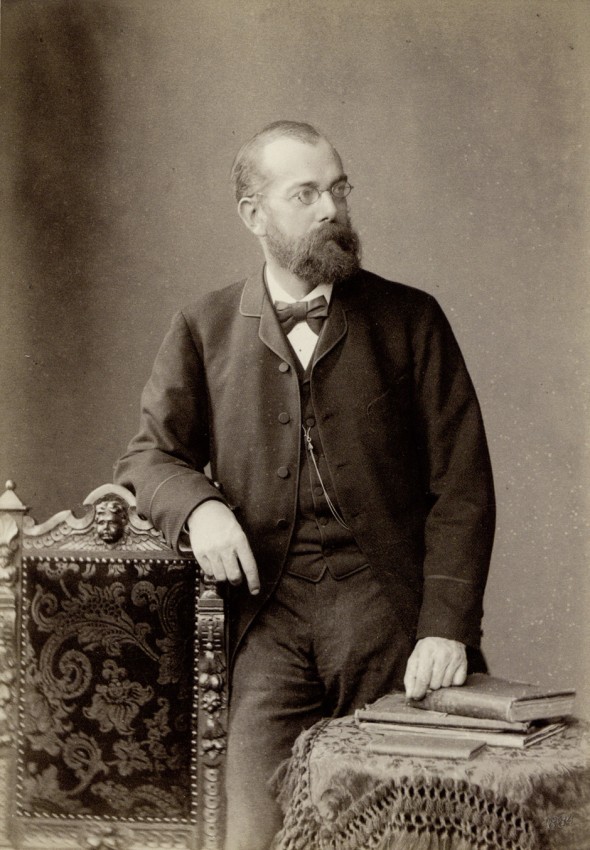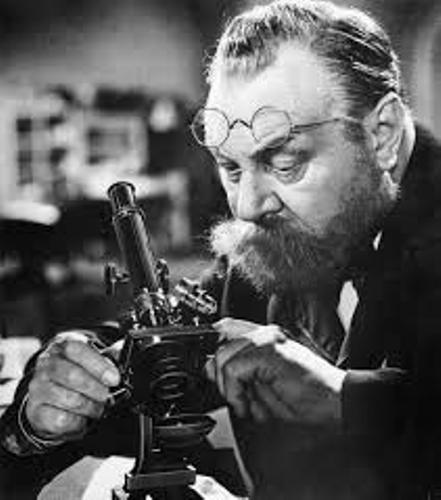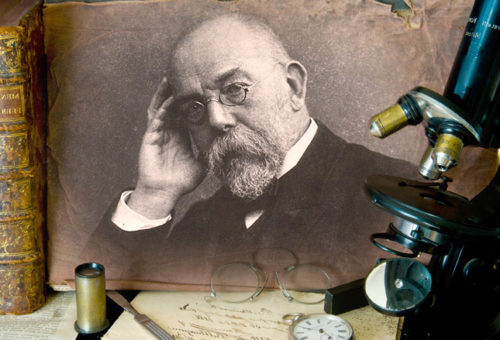Robert Koch: Modern Bacteriology
A man after my own heart, Dr. Robert Koch, one of the top 50 “influencers” of medicine of all time, loved to travel—except he had the where-with-all and time to actually do it.
Dr. Robert Koch, father of modern bacteriology
Before this man, medicine was full of theories to the effect that diseases were caused by “ethers” and imbalances of “vapors” within the human body—spontaneous generation.
When the tide began to change in beliefs, what true scientists needed was to find the “smoking gun” for causation, so to speak, and Dr. Koch gave it to them—and then some!
Robert Koch (1843-1910) – #41
World Traveler, “Bug” Hunter and Prize Winner
At the age of five, Robert, announced to his parents that he had taught himself to read using their German newspapers! That began his life-long odyssey with scientific study, coupled with his father’s passion: a strong urge to travel.
Early Life and Education of Robert Koch
Robert Koch was born in the mining town of Clausthal, Hanover, Germany, on 11 December 1843, to Hermann Koch, a mining engineer and Mathilde Julie Henriette Biewand. The third son of thirteen children, he obviously excelled in academics having taught himself how to read and write even before entering school.
He graduated from high school in 1862 excelling in science and math; then, at 19 entered the University of Göttingen to study natural science but shortly changed to the study of medicine, wanting to be a physician on a ship somewhere in order to travel.
Still in college, he was sought out to participate in others’ research but rapidly begun researching on his own; which led to his dissertation and graduation from medical school in 1866 (age 23)—again, earning honors of the highest distinction.

He served in the military as a surgeon in the Franco-Prussian War; then practiced as a physician in Wollstein, Posen. From 1885 to 1890, he served as an administrator and professor at Berlin University.
He married Emma Adolfine Josephine Fraatz July 16 1867 and the two had a daughter, Gertrude, September 6, 1868. He met actress Hedwig Greiberg thirty-years his junior and in 1893 divorced Emma to marry her.
Later life:
The “ether” and “vapor” ideas really didn’t sit well with many academics of the time but they had no way of proving that “organisms” were the culprits. That is what Koch did for medicine: invented the methods of selectively growing organisms in pure culture so they could be experimented upon.
He grew the anthrax bacillus from infected animals and showed that it could then be transmitted to other cattle. He used the microscope given to him by his wife to watch the bacillus form spores in order to “tide themselves over” periods of unfavorable conditions; then, rejuvenate to infect others when conditions improved.
With his associates, especially Dr. Petri, he developed all the methods and much of the equipment (like Petri dishes, Ager, stains, glass slides etc.) still used today to study disease.
He fixed, stained and photographed bacteria from wounds of all kinds and is credited with most of the methods to control the diseases decimating humans in that era, such as: anthrax, cholera, malaria, blackwater fever, typhus and tuberculosis—not to mention all the diseases of cattle that he studied.
He also laid down the conditions, known as Koch’s postulates, which must be satisfied before it can be accepted that particular bacteria cause particular diseases. These Koch’s Postulates, four of them, are still memorized by medical students and scientists today.

He invented the “tuberculin” which became used to diagnose a person infected with the disease, and assisted his colleagues with their work on Diphtheria.
His definitive proof that the “consumption,” which was laying waste to whole populations of the time, was not hereditary but rather caused by a bacillus, garnered him the Nobel Prize in 1905; which was only one of the hundreds of awards, honorary citizenships and honors given him throughout his career.
As was his passion, he did get to travel the world to study diseases and lecture. Even long after his death, he was posthumously honored by memorials and awards in several countries.
He suffered a heart attack on April 9th, 1910 and never fully recovered. In may of that year he honored a commitment to lecture on his tuberculosis research at the Prussian Academy of Sciences then three days later died in Baden-Baden at the age of 66.
Biographic Summary
Robert Koch was a German physician and microbiologist
Born: 11 December 1843, Clausthal, Hanover, Germany
Died: 27 May 1910, Baden Baden, Germany
Education: University of Göttingen
Known for: Being the founder of modern bacteriology, Koch’s Postulates, identifying the specific causative agents of tuberculosis, cholera, and anthrax, Nobel Prize 1905
Parents: Hermann Koch, a mining engineer (father); Mathilde Julie Henriette Biewand (mother)
26 Posts in Top 50 Doctors (top50) Series
- 26 - Carlos Chagas, Chaga's Disease & pneumocystis pneumonia. – 10 Apr 2025
- 27 - Charles D. Kelman - Cataracts – 9 Mar 2023
- 28 - Cicely D. Williams, Kwashiorkor, Breastfeeding, Whistleblower – 21 Jun 2022
- 29 - Dame Cicely Saunders, Hospice – 23 Apr 2018
- 30 - David L. Sackett, Evidence-based Medicine – 2 Apr 2018
- 31 - E. Donnall Thomas & Joseph Murray, Bone Marrow Transplants – 23 Feb 2018
- 32 - Elizabeth Blackwell, women in medicine – 29 Jan 2018
- 33 - Elisabeth Kübler-Ross, stages of grief – 5 Jan 2018
- 34 - Watson & Crick, DNA – 2 Dec 2017
- 35 - Mahmut Gazi Yaşargil, Micro-Surgery – 24 Oct 2017
- 36 - George Papanicolaou, Cytopathology, Cancer – 29 Sep 2017
- 37 - Dr. James Parkinson, Parkinson's Disease – 1 Sep 2017
- 38 - Dr. John Snow, cholera – 20 Aug 2017
- 39 - Dr. Joseph Kirsner, GI Joe – 27 Jul 2017
- 40 - Lawrence (Larry) Einhorn, chemotherapy – 16 Jun 2017
- 41 - Robert Koch, modern bacteriology – 21 Mar 2017
- 42 - Stanley Dudrick, TPN – 28 Feb 2017
- 43 - Stanley Prusiner, neurodegenerative diseases – 25 Jan 2017
- 44 - Victor McKusick, medical genetics – 3 Jan 2017
- 45 - Virginia Apgar, anesthesiology & newborn care – 12 Nov 2016
- 46 - William Harvey, circulation – 12 Oct 2016
- 47 - Zora Janžekovič, burns – 26 Sep 2016
- 48 - Helen Taussig, blue babies – 3 Sep 2016
- 49 - Henry Gray, anatomy – 3 Jul 2016
- 50 - Nikolay Pirogov, field surgery – 11 Jun 2016
- Top 50 Doctors: Intro/Index – 10 Jun 2016
Advertisement by Google
(sorry, only few pages have ads)

